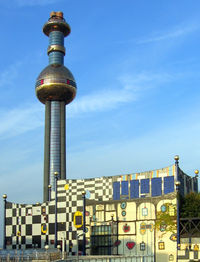
Photo from wikipedia
Environment-friendly and sustainable routes for municipal solid waste (MSW) incineration bottom ash (IBA) recycling and utilization is one of the major concerns for the urbanized countries like Singapore. In this… Click to show full abstract
Environment-friendly and sustainable routes for municipal solid waste (MSW) incineration bottom ash (IBA) recycling and utilization is one of the major concerns for the urbanized countries like Singapore. In this research paper, the possibility of bulk utilization of MSW-IBA as a catalyst support material has been explored for sustainable syn-gas production. The change in the texture of the IBA with simple hydrothermal treatment using NaOH has also been investigated. Furthermore, with hydrothermal treatment for 24 h at 180 °C, the texture of raw IBA with respect to basicity, surface area, total pore volume and reducibility was greatly improved. These textural properties are highly significant for a material to be utilized as a catalyst or catalytic supports for reforming applications. Ni supported on hydrothermally treated IBA was tested for steam reforming of biomass tar reforming reaction between 700 °C and 800 °C at relatively low steam-to-carbon ratio of 2. Among all the catalysts, Ni supported on IBA hydrothermally treated for 24 h gave stable toluene conversion (of 40%) at 700 °C with reduced coke formation (of 7.5 mgC/g·h) than other catalysts. The superior catalytic performance of this catalyst is mainly due to the presence of high amounts of surface Ni° species and improved reducibility and basicity properties among all. The Raman, DT/TGA and XRD analyses on spent catalysts revealed the deposited carbon during steam reforming of tar reaction is majorly amorphous. Due to this, the deposition of carbon did not show any kind of deactivation within the catalyst testing period.
Journal Title: Waste management
Year Published: 2018
Link to full text (if available)
Share on Social Media: Sign Up to like & get
recommendations!